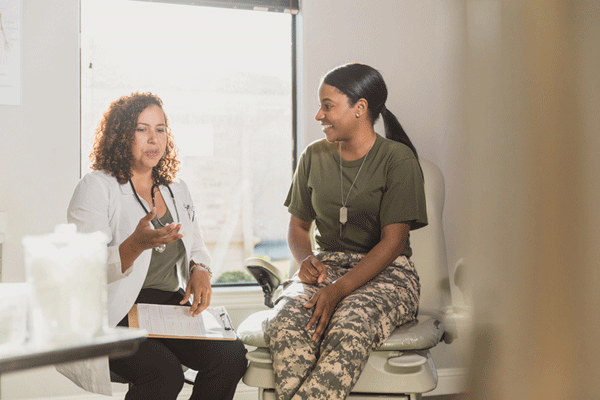Military culture doesn’t always make self-care easy, said Pamela Price, who served in the U.S. Army for 10 years as a medic and nurse. Servicewomen often put their duties above their health and well-being — a type of neglect that can lead to serious consequences.
“You’re contractually bound to your branch of service, and women give that [commitment] precedence,” Price said. “By virtue of doing that, you tend to neglect your own health until it’s something really bad that you can’t ignore.”
Ignoring vaginal health, for instance, can result in yeast infections, urinary tract infections and bacterial vaginosis, Price said.
After her exit from the military, Price began a career in public health, a space she’s worked in for more than two decades. She’s currently the deputy director of The Balm in Gilead, a nonprofit that aims to eliminate health disparities among Black communities in the United States and East Africa.
Price has focused much of her work over the past 20 years on women’s health. She believes all women should be empowered to prioritize their health, and in the military, that message should come from within the ranks.
“The culture of the military doesn’t always make women feel like they have the space to practice self-care,” Price said. “I think women should be able to put their health first, knowing that it’s going to help them be a better soldier, stay in shape and be fit for duty.”
Preparation is key to maintaining good feminine hygiene
Even in the harshest work environments, including long days of patrol or extended periods out in the field, servicewomen can prepare to keep clean by packing the correct supplies, Price said.
In the Army, soldiers are taught to keep a “go bag” full of clothing and supplies in case they’re called to respond to an emergency situation. Servicewomen should build on that idea and keep a separate kit for personal hygiene, Price said. Inside, she suggested that servicewomen keep baby wipes, alcohol wipes, cotton swabs and their preferred feminine hygiene products.
Price warned against some vaginal products, including douches, perfumed wipes, and scented tampons and pads. Those products can act as irritants and change the balance of vaginal bacteria. Throwing off the balance of vaginal bacteria leads to discharge, itching and pain, and can cause bigger issues, such as various types of vaginitis.
Servicewomen should stay away from douching in particular, Price said. With douching, women insert a solution into the vagina to flush it out. In an attempt to clean the vagina, women who use douches are actually flushing out beneficial bacteria.
The vagina is a self-cleaning organ, and douching is unnecessary. In some extreme cases, douching can cause pelvic inflammatory disease, an infection of the reproductive organs, and can lead to cervical cancer.
“I would recommend having wipes that are unscented to give yourself a real superficial cleanse of your vital areas until you can get a proper shower,” Price said.
When and where possible, Price recommended showering every day to rid your skin of germs and decrease your risk of vaginal infections. However, she admits that daily showers aren’t always a possibility for servicewomen on duty.
Servicewomen can use unscented wipes as a temporary measure, and they should use alcohol wipes to keep their hands clean, Price said. Alcohol wipes should also be used to clean under nail beds, which can harbor harmful bacteria.
In addition to bringing unscented wipes, Price suggested that servicewomen prepare for long lengths of time without a shower by packing as many pairs of underwear as they can, as well as extras of other undergarments, such as T-shirts that fit under their uniforms.
On the front lines, where laundry services aren’t available and neither are sinks, servicewomen could wash their underwear at the large water trailers on base, known to service members as water buffaloes. However, as a first course of action, Price recommended bringing enough clean underwear to last between real washings.
How to deal with your period on duty
For servicewomen who are on their period, having the time and ability to change out feminine hygiene products can be challenging, Price said.
In many cases, servicewomen with patrol assignments know how long they’ll be on duty, so Price suggested that servicewomen prepare by keeping the right number of products in their uniform when their shift begins. Having clean hands while changing out a tampon or pad is also key to not introducing new bacteria. Again, Price recommended alcohol wipes for keeping hands and nail beds clean.
When asked about whether servicewomen should consider suppressing their menstrual periods with an intrauterine device (IUD) to avoid the issue altogether, Price said that it would have to be considered on a case-by-case basis. There are a lot of factors, including a woman’s age, childbearing goals and military duties.
For women in combat or stationed in areas without many resources, it could be something to think about, she said.
“It’s going to be one less thing that you have to be concerned about,” Price said. “Hopefully between that woman and her primary care provider, they can weigh all of the options.”
Following proper feminine hygiene practices while on duty isn’t just key to a servicewoman’s physical health — it’s also important for her mental well-being, Price said. Servicewomen may feel embarrassed, ashamed or stigmatized because of their lack of cleanliness, especially in situations where men and women are co-living.
Women may not feel as comfortable or good about themselves if they don’t feel clean, which can manifest in mental health issues.
“I think there’s an underlying mental health aspect to it,” Price said. “It’s important to create your own kind of personal hygiene care plan for those times when you’re not going to be at home.”















